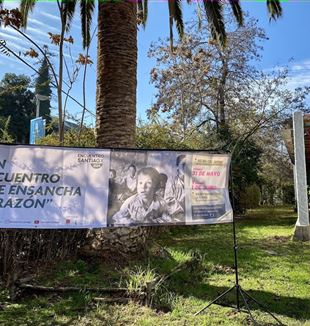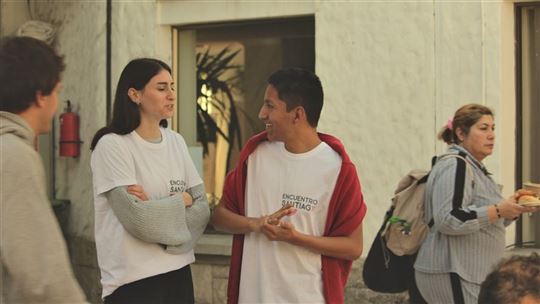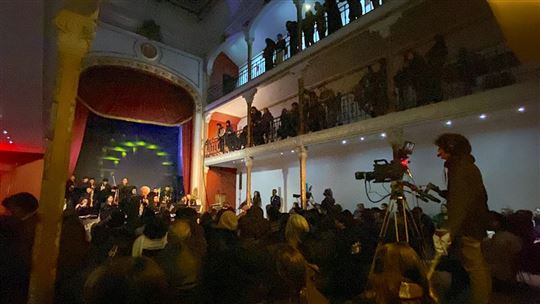
Encuentro Santiago's “open reason”
The two-day cultural event in Chile's capital returns after two years. Among debates, meetings and performances, a challenge: how does the Christian experience respond to the questions of the human of our time?In 2023, the Encuentro Santiago did not take place. It was decided to take a break and a group of friends, most of them involved in the organization, had gone to Madrid to participate in the Encuentro Madrid, the Spanish event that, having a longer history, allowed us to grow and gave us the inspiration for this year's edition.
The title of our event, “An Encounter that broadens reason,” already invites us to judge reality from our encounters with people and experiences in which a more open gaze can be perceived, at a time when we are saturated by partial answers that claim to be crucial, but which turn out to be incomplete and insufficient in the face of questions about the human. This is the challenge we must face in the social context in which we are immersed, in Chile and in the rest of the world: crises of trust, problems of coexistence, violence, claims for greater social justice and even the very meaning and value of life. In the face of all this, a living encounter is urgently needed, in which the other truly is a good.
On Friday, May 31, in a packed Huemul Theater, in an old working-class neighborhood near downtown Santiago, we began with a concert by the “Chile Big Band,” which, led by maestro Carl Hammond, has been playing Chilean jazz and popular music for 20 years. The warm atmosphere they created through their performance of the different pieces not only aroused emotions, but also revealed a dynamism in which the singularity of each instrument contributes to the whole to provide a splendid show. The residents of the neighborhood were very happy and grateful for having revived a theatre that had been idle since before the 2019 crisis, also bringing physical and social degradation to the neighborhood.
We continued on Saturday, June 1, moving to “La Araucana” Recreation Center in the La Florida neighborhood in the southeastern district of the city. The morning opened with a time dedicated to young people. We then gathered in the hall for a meeting entitled “Sickness and Loneliness. The protection of a presence and the debt of the law,” organized by friends from the Compagnia delle Opere. Juan Pablo Zúñiga, the first patient of the “Clínica Familia,” a work created in Santiago by Fr. Baldo Santi in the 1990s for AIDS patients, and a current collaborator of the center, and Dr. Carlos Rivera, a surgeon at the Universidad de Los Andes, testified to us how the presence of another who welcomes with affection and cares not only for physical health but for the whole person is fundamental to the treatment of illness and to overcoming despair. This human companionship should also be the axis on which public health policies are articulated.
This was followed by the meeting “Science and Enterprise,” featuring César Giacosa, a chemical engineer, Karen Fuenzalida, a biochemist and researcher in the field of metabolic diseases at the University of Chile, and Natalia Brossard, an agricultural engineer at the Pontifical Catholic University of Chile. She spoke about a project in which, starting with the health benefits discovered in seaweed used for industrial purposes, came the initiative of an interesting dialogue between scientific research and different companies, where what matters is the process of building bridges between different areas, academic and productive, in search of something that is useful for everyone and promotes the common good. While the dialogue was happening in the hall, friends, families, speakers and many others were able to share the provocations of the meetings or simply enjoy each other’s company in the cafeteria, with excellent food and drinks.
In the afternoon, we gathered for the third meeting, “A judgment to discover the meaning of life,” organized by the university students of the movement. Camila Kellemen, a clinical psychologist who is specialized in Integral Psychology of the Person, and Pamela Chávez, Doctor of Philosophy from the University of Chile, invited us to look at the problem of the “crisis of meaning.” It is a provocative topic that brings us back to the ultimate question of the infinite desire for happiness, something that cannot be given by oneself, but is received as a generous gift from an Other through the companionship of friends, family and close ties. And for that to materialize requires a willingness to “receive,” to be loved as one is: from this love blossoms the self as a gift to others.
Throughout the day, it was possible to visit the exhibition on Takashi Paolo Nagai, a Japanese physician and witness to “what never dies”, in the main lobby of the Center. He is also a witness to the fact that no circumstance can prevent us from communicating the truth and ultimate consistency of what is human. This experience was highlighted by the presentation of the book Ciò che non muore mai [What Never Dies], with speeches by María Angélica Kolbach, a teacher, and Martín Groos, a member of the Friends of Takashi Nagai and Midori Foundation.
Read also - "Among refugees to make room for miracles"
Our friends Álex Pérez, director of the Patrona de Lourdes Institute, which is linked to the movement, and Gerardo León, spoke on the theme of the Encuentro. They emphasized the need to return to look at reality and immerse ourselves in it considering the totality of its factors. This requires an openness to knowledge and the ability to judge according to reason, in times when we are surrounded by subjectivism that leaves the big personal and social questions unanswered. Christian experience is capable of going to the depth of things and generating a dialogue in which we are no longer determined by circumstances, but are able to build from them.
To conclude the event, an adaptation of Cormac McCarthy's play The Sunset Limited was staged, directed by Bernabé Madrigal, which tells the story of an encounter between a wealthy, non-believing man who attempts suicide but is saved by an ex-convict convert to Christianity. Encuentro Santiago has once again proved to be an experience that allows one to meet people, friendships, and stories that challenge and renew. And it is increasingly growing, becoming a place from which we do not leave distracted or anesthetized, but glad and grateful to understand that we were made for a good destiny.